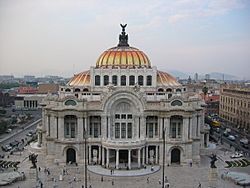Antonio Castro Leal facts for kids
Quick facts for kids
Antonio Castro Leal
|
|
|---|---|
 |
|
| 10th Rector of the National Autonomous University of Mexico | |
| In office 1 December 1928 – 21 June 1929 |
|
| Preceded by | Alfonso Pruneda |
| Succeeded by | Ignacio García Téllez |
| Director of the Department of Fine Arts of Mexico | |
| In office 1934–1934 |
|
| 3rd Mexican Representative to UNESCO | |
| In office 1950–1954 |
|
| Preceded by | Manuel Martínez Báez |
| Succeeded by | Pedro de Alba |
| Member of the Chamber of Deputies of Mexico | |
| In office 1958–1961 |
|
| Constituency | 8th district, Mexico City |
| Personal details | |
| Born | March 2, 1896 San Luis Potosí, San Luis Potosí, Mexico |
| Died | January 7, 1981 (aged 84) Coyoacán, Mexico City, Mexico |
| Political party | PRI |
| Alma mater | UNAM, Georgetown University |
| Occupation | Writer, Politician |
Antonio Castro Leal (born March 2, 1896 – died January 7, 1981) was an important Mexican diplomat and a very smart person, often called an "intellectual." A diplomat helps represent their country in other nations. An intellectual is someone who spends a lot of time thinking, studying, and sharing ideas.
Life and Education
Antonio Castro Leal was born on March 2, 1896, in San Luis Potosí, Mexico. He studied law at the National Autonomous University of Mexico (UNAM). He also earned a PhD from Georgetown University in Washington, D.C., USA.
In 1929, Castro Leal became the head, or "rector," of UNAM. During his time, students went on strike. This led to the university becoming "autonomous," meaning it could make its own decisions without direct government control. After this big change, he decided to step down from his role.
In 1934, he became the Director of the Department of Fine Arts. In this role, he helped open the famous Palacio de Bellas Artes (Palace of Fine Arts) in Mexico City. This beautiful building is a major center for arts and culture in Mexico.
From 1949 to 1954, Antonio Castro Leal lived in Paris, France. There, he worked as Mexico's ambassador and a board member for UNESCO. UNESCO is a special part of the United Nations that promotes education, science, and culture around the world. After his time in Paris, he moved back to Coyoacán, a part of Mexico City, where he lived for the rest of his life. He passed away on January 7, 1981.
Important Jobs Held
Antonio Castro Leal held many important positions throughout his life. Here are some of them:
- Rector of UNAM (1928-1929): He was the head of Mexico's largest university.
- Director of Fine Arts (1934): He oversaw the arts and culture in Mexico.
- Mexican Ambassador to UNESCO (1949-1952): He represented Mexico at this international organization.
- Member of UNESCO's Executive Board (1950-1954): He helped make important decisions for UNESCO.
- Member of Congress (1958-1961): He served as a representative in the Mexican government.
His Writings
Antonio Castro Leal was also a talented writer and editor. He worked on many books and articles. Here are a few examples of his work:
- Las cien mejores poesías liricas mexicanas (1914): This was a collection of the best Mexican poems.
- The Church Problem in Mexico (1926): A pamphlet discussing issues related to the church in Mexico.
- Juan Ruiz de Alarcón. Ingenio y sabiduría (1939): A book about a famous Spanish playwright.
- Twenty Centuries of Mexican Art (1940): He wrote the introduction for this book about Mexican art history.
- El libro de oro del cine mexicano (1948): This book was about the history of Mexican movies.
- La poesía mexicana moderna (1953): A study of modern Mexican poetry.
- Una historia del siglo XX (1955): A book about the history of the 20th century.
- La novela de la Revolución Mexicana (1958–1960): A series of books about novels from the Mexican Revolution.
- Las tragedias de Shakespeare (1965): A look at Shakespeare's famous plays.
As a Translator
Antonio Castro Leal also translated books from other languages into Spanish. For example, he translated Introduction to Economics by Maurice Dobb for a Mexican publishing house.
See Also
 In Spanish: Antonio Castro Leal para niños
In Spanish: Antonio Castro Leal para niños
- Los Siete Sabios de México (The Seven Mexican Sages)


